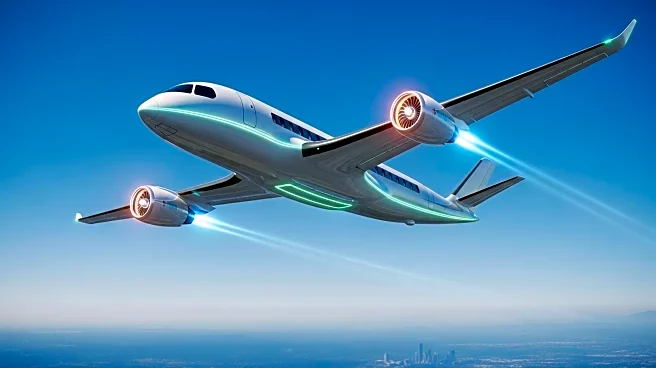What's Happening?
Israeli aviation startup Air VEV has received a U.S. Federal Aviation Administration (FAA) certificate for its electric vertical takeoff and landing (eVTOL) aircraft, the Air One. This certification, granted under the new MOSAIC regulation, allows the aircraft to operate as a light sport aircraft for private recreational flights outside populated areas. The Air One is designed to carry two passengers or transport unmanned cargo loads of up to 250 kilograms, with a top speed of 250 kilometers per hour and a maximum flight time of one hour. The company plans to begin deliveries to customers by 2026, with 2,500 customers already expressing interest. Air VEV is also targeting military markets, having secured contracts with the IDF and the U.S. military.
Why It's Important?
The FAA certification marks a significant milestone for Air VEV, positioning it to expand its presence in the U.S. market. The Air One's competitive pricing and innovative design could disrupt the aviation industry by making personal aircraft more accessible. The company's focus on both civilian and military markets highlights the versatility and potential applications of eVTOL technology. The move aligns with broader trends in the aviation industry towards sustainable and efficient transportation solutions. The success of Air VEV could pave the way for further advancements in electric aviation and influence regulatory frameworks in the U.S.
What's Next?
Air VEV plans to continue prototype test flights in Israel and Florida, with FAA inspectors overseeing the process. The company will also host demonstrations for potential customers and investors in Florida. As Air VEV progresses towards delivering the Air One to private customers, it will likely face competition from other companies in the eVTOL market. The company's involvement in the U.S. Air Force's Agility Prime program and its contracts with the IDF suggest potential for further military applications. The success of these initiatives could lead to expanded use cases and increased demand for eVTOL technology.
Beyond the Headlines
The development of eVTOL aircraft like the Air One raises questions about the future of urban mobility and the regulatory challenges associated with integrating such technologies into existing airspace. The potential for personal aircraft to become more mainstream could lead to shifts in transportation infrastructure and urban planning. Additionally, the environmental impact of electric aviation compared to traditional aircraft could influence public policy and consumer preferences. As the industry evolves, ethical considerations around safety, privacy, and accessibility will also need to be addressed.











